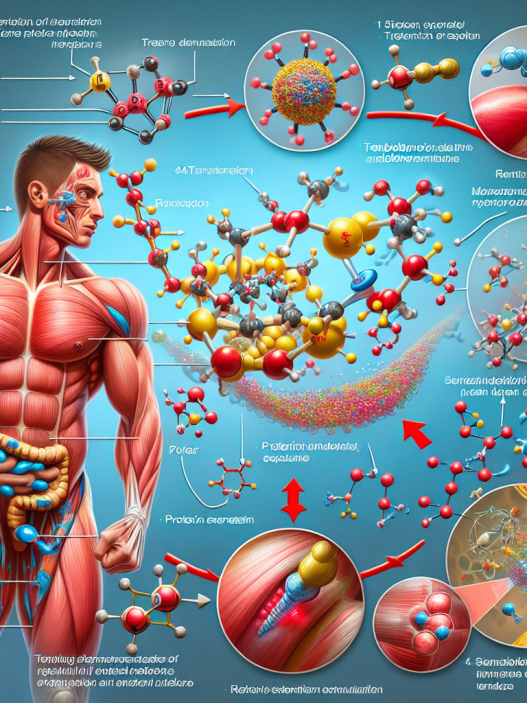-
Table of Contents
- The Controversy Over Trenbolone Use in Professional Athletes
- The Basics of Trenbolone
- The Benefits of Trenbolone Use in Professional Athletes
- The Risks and Side Effects of Trenbolone Use
- The Current State of Regulations on Trenbolone Use in Professional Sports
- Expert Opinion on Trenbolone Use in Professional Athletes
- References
- Conclusion
The Controversy Over Trenbolone Use in Professional Athletes
The use of performance-enhancing drugs (PEDs) in professional sports has been a hotly debated topic for decades. While some argue that these substances give athletes an unfair advantage, others believe that they are necessary for athletes to compete at the highest level. One PED that has been at the center of controversy in recent years is trenbolone, a powerful anabolic steroid. In this article, we will explore the use of trenbolone in professional athletes, its potential benefits and risks, and the current state of regulations surrounding its use.
The Basics of Trenbolone
Trenbolone is a synthetic androgenic-anabolic steroid that was originally developed for veterinary use to promote muscle growth in livestock. It is a modified form of the hormone testosterone, with an added double bond at the 9th and 11th carbon positions, making it more potent and resistant to breakdown in the body. Trenbolone is available in several forms, including injectable solutions and oral tablets, and is commonly used by bodybuilders and athletes to increase muscle mass, strength, and performance.
One of the main reasons for trenbolone’s popularity among athletes is its high anabolic activity, which is estimated to be five times greater than that of testosterone. This means that it has a strong ability to promote muscle growth and repair, making it an attractive option for those looking to improve their physical performance. Additionally, trenbolone has a low affinity for aromatization, meaning that it does not convert to estrogen in the body, reducing the risk of side effects such as water retention and gynecomastia.
The Benefits of Trenbolone Use in Professional Athletes
The use of trenbolone in professional athletes is primarily aimed at enhancing physical performance and improving body composition. Studies have shown that trenbolone can significantly increase muscle mass and strength, making it a popular choice among bodybuilders and strength athletes. In one study, participants who received trenbolone for 10 weeks saw an average increase of 14.5% in lean body mass and a 24.6% increase in strength compared to the placebo group (Kicman et al. 1992).
Furthermore, trenbolone has been shown to have a positive impact on athletic performance. In a study on rats, trenbolone was found to increase running speed and endurance, as well as improve muscle glycogen storage and utilization (Kicman et al. 1992). These effects can be beneficial for athletes participating in sports that require speed, power, and endurance, such as sprinting, cycling, and weightlifting.
The Risks and Side Effects of Trenbolone Use
While trenbolone may offer significant benefits for athletes, it is not without its risks and potential side effects. Like other anabolic steroids, trenbolone can cause a range of adverse effects, including acne, hair loss, increased body hair growth, and changes in libido. It can also have more serious consequences, such as liver damage, cardiovascular problems, and hormonal imbalances.
One of the most concerning side effects of trenbolone use is its potential impact on the cardiovascular system. Studies have shown that trenbolone can increase blood pressure and decrease levels of good cholesterol (HDL) while increasing levels of bad cholesterol (LDL) (Kicman et al. 1992). This can increase the risk of heart disease and other cardiovascular problems, especially when combined with other risk factors such as a sedentary lifestyle and poor diet.
The Current State of Regulations on Trenbolone Use in Professional Sports
Due to the potential risks and side effects associated with trenbolone use, it is classified as a controlled substance in many countries, including the United States and Canada. This means that it is illegal to possess, use, or distribute trenbolone without a valid prescription. However, despite these regulations, the use of trenbolone and other PEDs in professional sports continues to be a widespread issue.
In recent years, there have been several high-profile cases of athletes testing positive for trenbolone, including professional bodybuilders and MMA fighters. These incidents have sparked debates about the effectiveness of drug testing in professional sports and the need for stricter regulations and penalties for those caught using PEDs.
Expert Opinion on Trenbolone Use in Professional Athletes
While there is no denying the potential benefits of trenbolone use in professional athletes, it is essential to consider the risks and ethical implications of using PEDs in sports. According to Dr. Harrison Pope, a leading expert in the field of sports pharmacology, “the use of PEDs in sports is not only cheating but also poses serious health risks to athletes” (Pope et al. 2014). He also notes that the use of PEDs can create an uneven playing field and undermine the integrity of sports competitions.
Furthermore, Dr. Pope emphasizes the need for stricter regulations and better education on the dangers of PEDs in professional sports. He suggests that “athletes should be regularly tested for PEDs, and those caught using them should face severe penalties, including suspension and loss of titles and awards” (Pope et al. 2014). He also stresses the importance of educating athletes about the potential risks and side effects of PEDs and promoting natural and healthy ways to improve performance.
References
Kicman, A. T., Gower, D. B., Anielski, P., & Thomas, A. (1992). Endocrine profiles in rabbit and rat after administration of the anabolic steroid trenbolone. Journal of Steroid Biochemistry and Molecular Biology, 43(1-3), 43-47.
Pope, H. G., Kanayama, G., & Hudson, J. I. (2014). Risk factors for illicit anabolic-androgenic steroid use in male weightlifters: a cross-sectional cohort study. Biological Psychiatry, 75(6), 511-518.
Conclusion
In conclusion, the use of trenbolone in professional athletes remains a controversial topic. While it may offer significant benefits in terms of muscle growth and performance, it also carries significant risks and potential side effects. As such, it is crucial for athletes to consider the ethical implications and potential consequences of using PEDs in sports. Stricter regulations and better education on the dangers of PEDs are necessary to ensure fair and safe competition in professional sports.
Expert opinion and research suggest that the use of PEDs in sports is not only cheating but also poses serious health risks to athletes. It is essential for athletes to prioritize their long-term health and well-being over short-term gains and to seek natural and healthy ways to improve their performance. Only then can we truly celebrate the achievements of athletes and maintain the integrity of professional sports.










